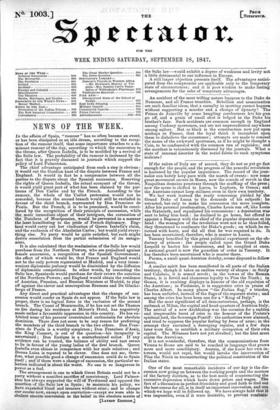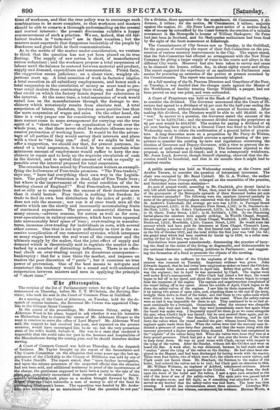One of the most remarkable incidents of our day is
the dis- cussion now going on between the working people and the masters of the factory districts, as to the best mode of counteracting the excessive depression which beats down prices and wages. The fact of a discussion in perfect friendship and good faith to find out the best course for all, is in itself an important innovation, and one which we hope will be followed up. We have always held that it was impossible, even if it were desirable, to prevent combine-
tions of workmen, and that the true policy was to encourage such Combinations to be more complete, so that workmen and masters should be able to comet° a thorough understanding on the several and mutual interests: the present discussion exhibits a happy commencement of such a practice. We see, indeed, that old tur- bulent traders in " turn-outs " are in their vocation ; but the masters must supersede that dangerous leadership of the people by frankness and good faith in their communications. As to the merits of the matter under consideration, we venture to think that the question has not yet been placed on its true footing. The supply of raw cotton is short, of manufactured cotton redundant; and the workmen propose a total suspension of labour until the balance be restored between material and product, supply and demand, expenditure and remuneration. Prima facie, the suggestion seems judicious; on a closer view, weighty ob- jections start up. A total cessation of work in factories implies a total cessation in all subsidiary employments, and hence such a total suspension in the circulation of money as must tend to pre- vent retail dealers from continuing their trade, and from giving that credit on which the factory hands depend for subsistence in the interval. At the same time, a total suspension of work would entail loss on the manufacturers through the damage to ma- chinery which notoriously results from absolute rest. A total suspension of labour, therefore, involves more positive loss than the mere suspension of wages and sales. On the other hand, the time is a very proper one for considering whether masters and men cannot come to some arrangement for carrying out the true .spirit of a "short-time" law—an equalization of work over the whole year, so that there never shall be absolute idleness nor ex- cessive protraction of working hours. It would be for the advan- tage of all parties if they would survey their interests and plans with a view to "the long run." And, if we might be bold to offer a suggestion, we should say that, for present purposes, in- stead of a total suspension, it would be best to ascertain what minimum amount of employment would suffice to keep the ma- chinery in repair and to keep up the requisite circulation of cash in the district, and to spread that amount of work as equally as possible over the interval proposed for total suspension.
The occasion has been seized by Protectionist writers as exempli- fying the hollowness of Free-trade promises. "The Free-traders," says one, " have had everything their own way in the Legisla- ture. The policy of Protection is dead, that of Free Trade lives ; but where is the improvement of the social condition of the la- bouring classes of England?" Real Free-traders, however, were not so silly as to expect from the success of their doctrine more than it could bestow. Free trade is nothing but freedom for trade to find its own best distribution by the index of profit : it does not rule the seasons ; nor can it at once teach men all the results which are the slowly and incessantly accumulating fruits of continued experience. The present commercial distress has many causes,—adverse seasons, for cotton as well as for corn ; over-speculation in railway enterprises, which have been squeezed into unreasonably brief space of time ; over-trading in manufac- tures, immense over-trading for individuals in corn, with several other causes. One that is not kept sufficiently in view is the ex- cessive complication of our commercial systems, which interposes so many stages between the real want of the consumer and the ultimate supply by the maker, that the joint effect of supply and demand which is theoretically said to regulate the market is dis- turbed by a number of distracting influences. There is no effec- tual check on over-trading except its disastrous consequence— bankruptcy : that for a time thins the market, and imposes on traders the poor discretion of " panic"; but it exercises no true power of prevention. One of the best means to mitigate and counteract this tendency would be a sound and well-understood cooperation between masters and men in applying the principle of " short time."



























 Previous page
Previous page